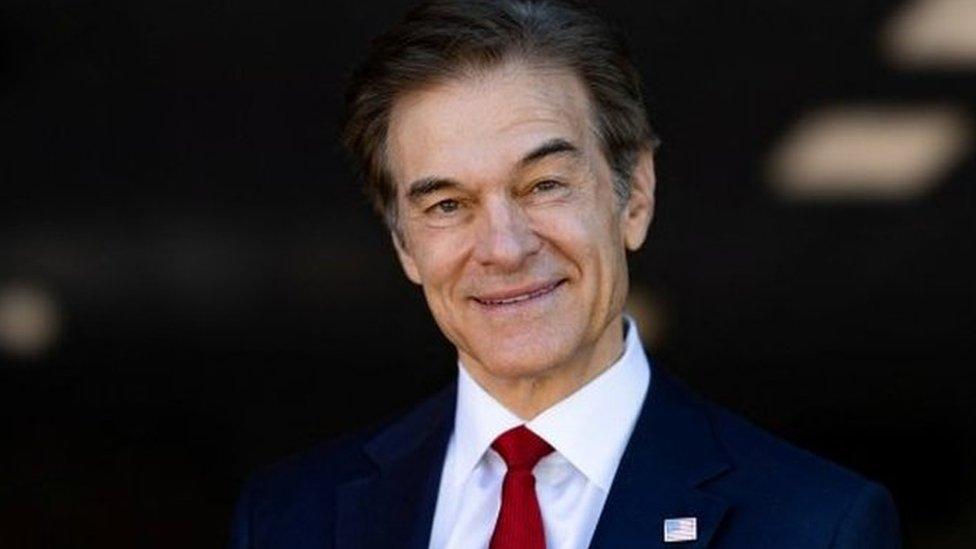US mid-terms 2022: Tracking Trump's 'extraordinary' endorsement spree
- Published
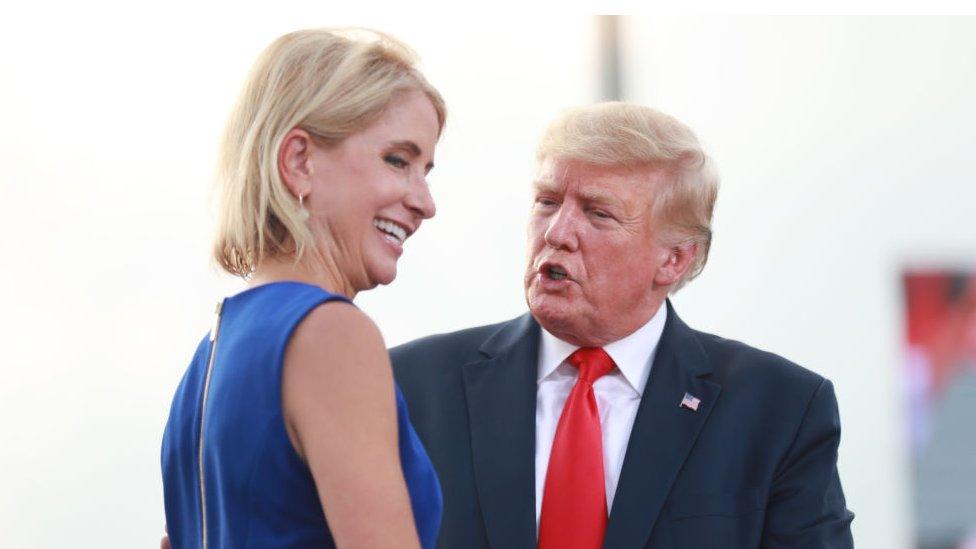
Candidates Donald Trump endorses, like Mary Miller here, tend to win
Donald Trump has shown great pride in hand-picking the next wave of Republican stars.
Back when he was still in the White House, he wrote on Twitter: "As long as I campaign and/or support Senate and House candidates (within reason), they will win!"
In this primary season, he hasn't been far off.
Over the past several months, candidates endorsed by Mr Trump have pocketed victories across the country, winning 92% of the time.
From his home in Palm Beach, Florida, the self-proclaimed "king" of endorsements has weighed in on almost 200 races, backing Republican candidates running for the US Senate, House or state governor in 39 out of 50 states. It is an unusually high number - during the 2018 mid-terms, he backed just under 90 candidates for those same positions, according to Ballotpedia. That same year, former President Barack Obama endorsed 94 candidates.
The election will see voters decide who gets to sit in Congress, as well as hold key positions in their home state. And come November, it is Mr Trump's picks who will be representing the Republican Party on ballots across the US.
"It's extraordinary, because most ex-presidents walk away," said Charles Coughlin, a Republican party operative. "That's not what he's doing."
As the primary season draws to a close, here is a look at Mr Trump's full endorsement record - who he supported, how they did, and the races he could not swing.
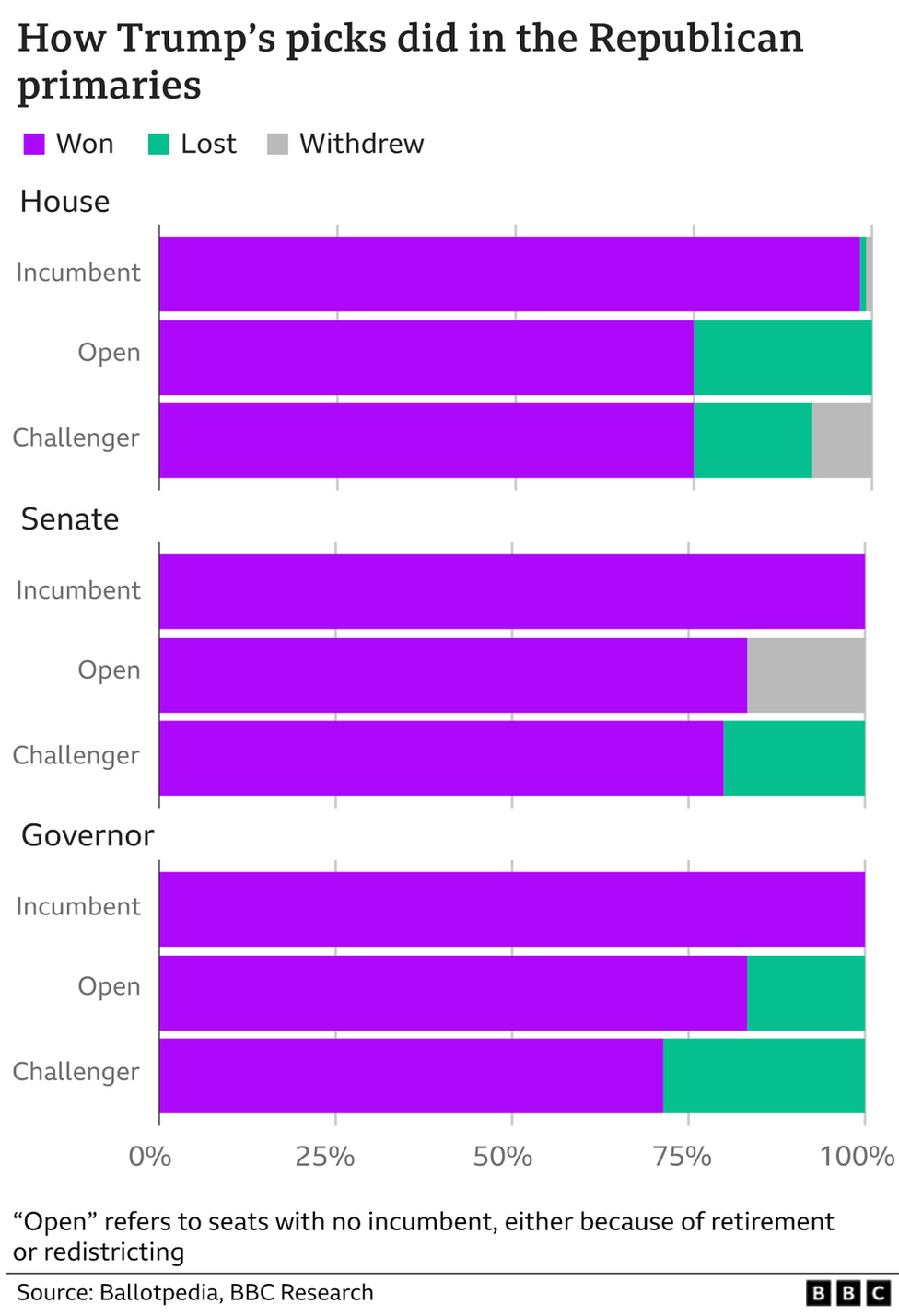

While it is beyond doubt that Trump backs winners, there is an important caveat: many of these races were a sure thing from the start.
Some 54 (nearly one-quarter) of Mr Trump's candidates ran unopposed.
And his record was boosted further by supporting a large majority (74%) of incumbents - tried and true candidates with Republican bonafides who had won their seats in the last election and were running for office again. In fact, only a single Trump-endorsed incumbent lost: the scandal-ridden Madison Cawthorne, who served two years as a House representative from North Carolina.
"He is clearly endorsing a number of people who are going to win anyway, so he can run up the percentage of victories. That's just a smart strategy to run the numbers up," said Whit Ayres, a longtime Republican strategist.
"The endorsements make him the most prominent figure in the Republican party," he added. "And it increases his influence when Republicans are constantly asking for his endorsement."
In open seats, where there is no incumbent either because of retirement or redistricting, a Trump-backed candidate won 83% of the time. And in races where the winner would face off against a Democratic incumbent in November, his pick won 100% of the time.
Mr Coughlin said the former president views "every candidate as a proxy for himself". Their wins reflect back on him, and in many cases, they resemble him too. Of the new candidates that Mr Trump endorsed, who were not incumbents, roughly 80% were Caucasian and 70% were male.
And, like Mr Trump when he first ran for president, many (53%) were political neophytes, who had never held office before. The rookies ranged from celebrity doctor Mehmet Oz, to former college football player Bo Hines, just 26 years old and now the Republican nominee from North Carolina's 13th congressional district.
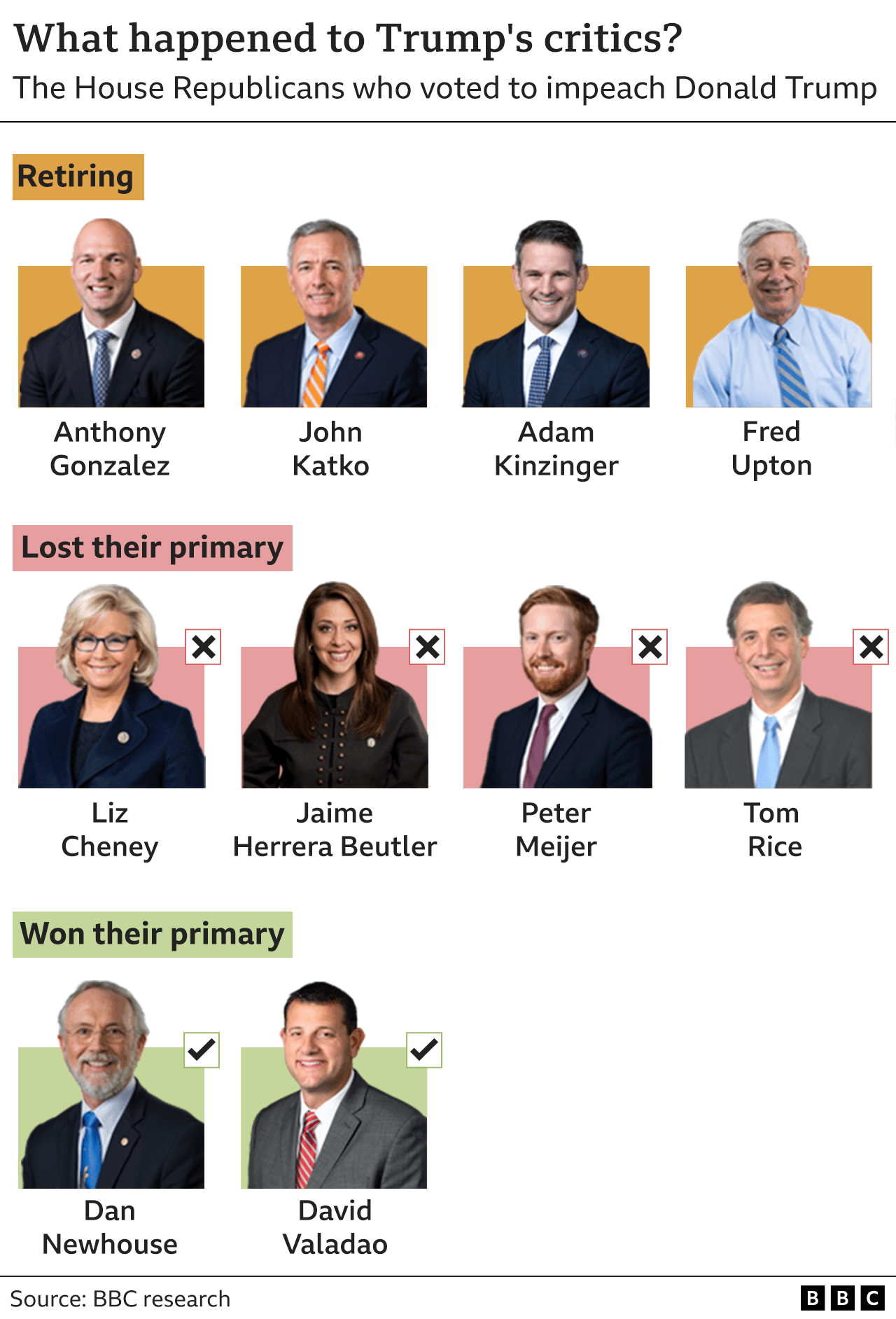

Loyalty was key in securing an endorsement. The majority of candidates promoted, in some way, Mr Trump's unfounded claim that he won the 2020 presidential election. Many Trump-backed incumbents (42%) who held office in Congress in January 2021 voted to overturn the election results. Others, like Kari Lake, a former news anchor and Arizona's Republican candidate for governor, have made Mr Trump's false election claims central to her campaign.
"It's a litmus test that you have to pass. You have to be an advocate for the idea that there was some fraud in the last election," Mr Coughlin said.
An Achilles heel
In many ways, Mr Trump's endorsements seemed to be less about providing support than a personal mission to banish his critics from office.
"His endorsement is really more of a threat to people: 'You better stick by me, you better defend me, or I'll work against you,'" said Cheri Jacobus, a long-time Republican insider who left the party when Donald Trump became its nominee in 2016. "It's used as a weapon."
No candidates were more aggressively targeted than the 10 House Republicans who voted to impeach Mr Trump for his role in the 6 January Capitol riots. Of the six who ran for re-election this year, just two prevailed: Representative Dan Newhouse in Washington state, and Representative David Valadao of California.
But going after people in his own party does not always pan out. When he backed a candidate against a Republican incumbent, he won only four out of 10 times, with five losses and one withdrawal.
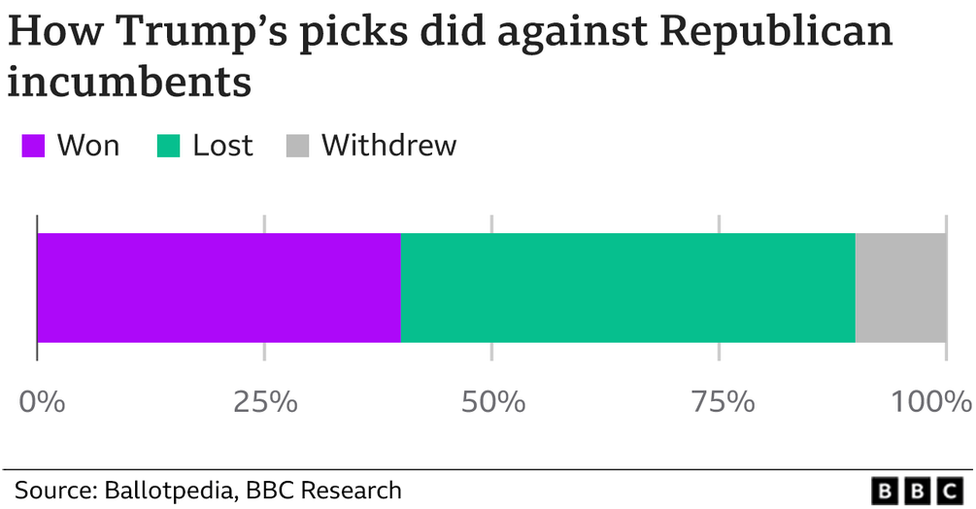

This played out in Georgia - a critical swing state - where Governor Brian Kemp defeated former Senator David Perdue, handpicked by Mr Trump. It was a similar story in Idaho, where Governor Brad Little thwarted Janice McGeachin, the lieutenant governor with Mr Trump's backing.
Eyes on 8 November
While the primaries are mostly a battle in-house among the most committed party members, November's election will involve a full spectrum of voters - Democrats, Republicans and undecideds.
Some of the newcomers endorsed by the former president are likely to struggle, unaccustomed to the pressure and pace of a political campaign.
And in some races, notably in swing states that often go back and forth between backing Republicans and Democrats, the nod from Mr Trump may prove to be a liability if it forces voters to choose between a candidate on the right of the Republican party, and a centrist.
In Washington state, Republican candidate Tiffany Smiley - who had once courted Mr Trump's endorsement during the primary, but did not get it - declined to say whether she would welcome his endorsement in November.
"I am laser-focused on delivering results for the voters of Washington state and I have been clear about that from day one. I am focused on the future and we have a state to save, there are real people suffering here in Washington state," she told CNN's Dana Bash.
Since winning their primaries, several Republican candidates including Blake Masters of Arizona and Adam Laxalt of Nevada, have deleted references to Mr Trump from their online profiles - changes first reported by US outlets, including the Washington Post and the New York Times.
For Mr Trump, who's made it increasingly clear he wants to run for president again in 2024, how his candidates fare this autumn may provide a hint of his odds of returning to the White House.
Related topics
- Published14 September 2022
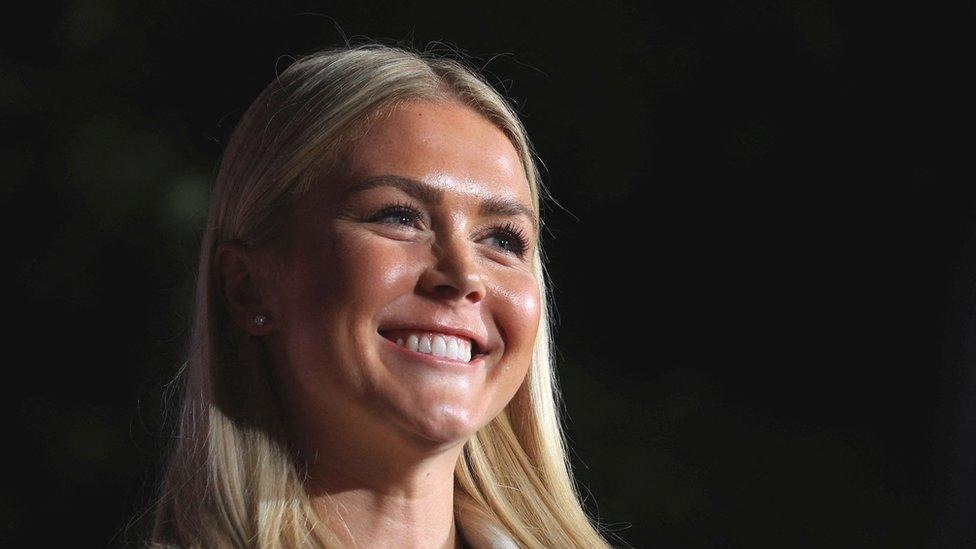
- Published4 September 2022
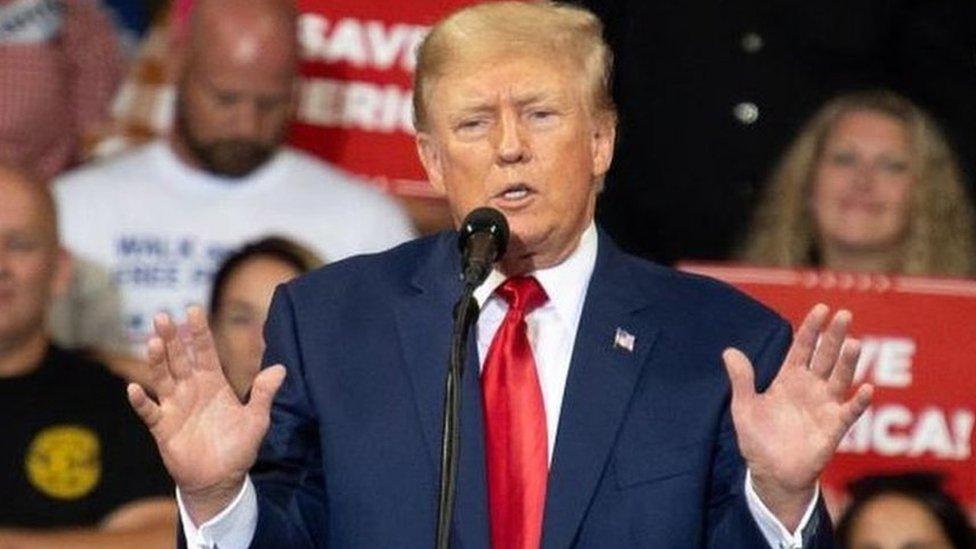
- Published17 August 2022
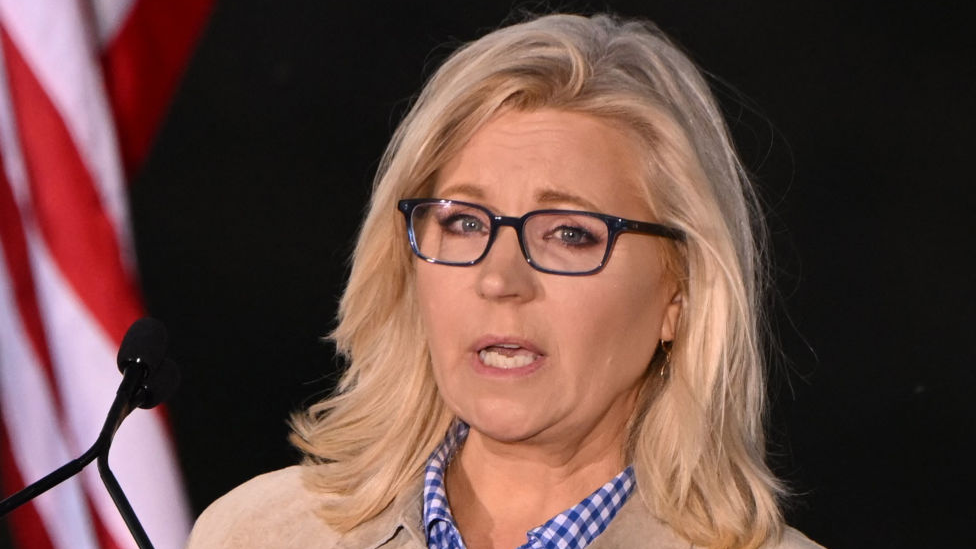
- Published4 May 2022
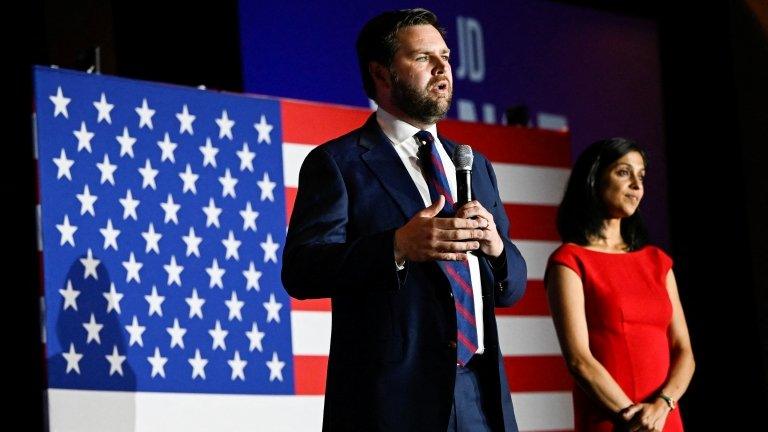
- Published19 May 2022
